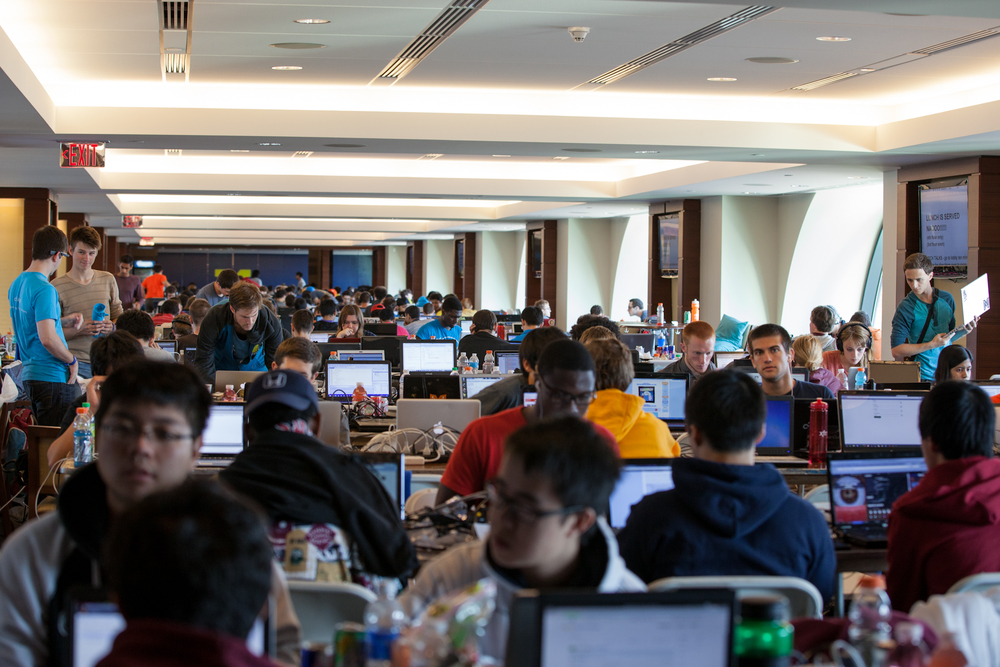Hacking our ecosystem

This is a guest post by Brad Dwyer, the founder of Hatchlings, a company that makes social games. Brad recently re-enrolled at Iowa State University to finish his degree after having dropped out to run his startup in 2010.
Over the past few months I’ve been traveling to (and participating in) student hackathons across the country. I’ve been to University of Michigan’s MHacks (twice), Caltech's HackTech, and University of Pennsylvania’s PennApps. If you’re not familiar with hackathons, they’re marathon programming events where participants (“hackers”) go from conception to creation all in the course of a weekend.
I’m convinced that hackathons like these are the future of computer science (and entrepreneurship) education. I’m also convinced that they are going to give rise to the next generation of innovators and disruptive startups.
The problem with education today
There’s nothing inherently wrong with the traditional computer science curriculum. There is a decent balance between coding and the theory behind it. After four years, students come out ready to start entry level jobs at great companies like Lockheed Martin, John Deere, and Microsoft. That’s what it was designed for. And it’s great.
“...our students are completely unaware that there is another option: founding or joining a startup.”
Unfortunately, this funnel is so effective that our students are completely unaware that there is another option: founding or joining a startup.
But building awareness of this alternative is only half of the issue. The other half is that our existing university system doesn’t teach students the two most important skills necessary for building a startup: identifying a problem and iterating on a solution. “Problem solving” in college starts when a professor gives you a problem and tells you to solve it. You give it a crack, turn it in, and you’re done.
Hackathons solve both problems
What I’ve seen with hackathons is a revelation amongst participants that they are actually capable of building something on their own.
“ The realization that you can forge your own path is the biggest step towards actually doing so.”
I’ve given several talks at universities and told countless students about how I started a business from my dorm room. But I’ve never seen the message “click” like I see at hackathons. The realization that you can forge your own path is the biggest step towards actually doing so.
The other half of the problem is solved through practicing the same techniques that make for a successful startup. Students are largely solving problems that they come up with themselves and then coming up with a solution. If they fail, they try again next time. If they succeed, they get valuable input at the demos on how to improve and oftentimes they continue to iterate.
And they’re surrounded by thousands of other students doing the same.
The Petri dish
The sheer density of intelligent, driven, skilled hackers at major hackathons is like nothing I’ve encountered before. The network of student hackers from across the country that you meet is unparalleled.
I expect there will be a huge network effect as the tales of cool hacks and successful student-started businesses spread by way of these newly forged friendships. This network is what keeps the momentum going and makes the mindset a way of life rather than something you did in college once.
(As an aside: I’ve made several important connections at Hackathons including our only real human points of contact at Facebook.)
Iowa State University's performance
Now for the part that’s relevant to our startup community: Iowa State has been impressive. Last fall they finished ranked 25th on Major League Hacking. Among the schools they beat were Illinois, Princeton, Virginia, USC, Penn State, Brown, Yale, Cornell, UCLA, Duke, Texas, and Harvard. That’s a pretty distinguished list.
The talent is here. The students have seen the light. Now we need to usher them in.
Fresh blood
If our ecosystem is going to continue to grow and thrive we need to assimilate the best and brightest of our hackers.
Hackathons are doing the hard part: they’re opening students’ eyes to the possibilities and training them to succeed in the world we live in.
“Area startups should make it our mission to hire as many hackers as possible and build a culture of makers here in Iowa”
It’s our job to be front of mind so that we can encourage and foster those who want to start a startup and ensure that those who start one do it here. Area startups should make it our mission to hire as many hackers as possible and build a culture of makers here in Iowa. The interest is there but our community is still largely unknown to these students even though we’re right next door.
Hire these students as interns. Mentor them. Engage them. Encourage them. Invest in them. They are our future.

Brad Dwyer has been the founder of Hatchlings since 2008. Hatchlings has had several hits (notably the Easter Egg themed games Hatchlings Match and Hatchlings 2). The team of 10 is headquartered at StartupCity Des Moines and is currently gearing up for the Easter Season.
Photo Credit: MHacks photo via xensin on Flickr. Headshot via Thinc Iowa / Anna Jones / Philip Harder on Flickr.
